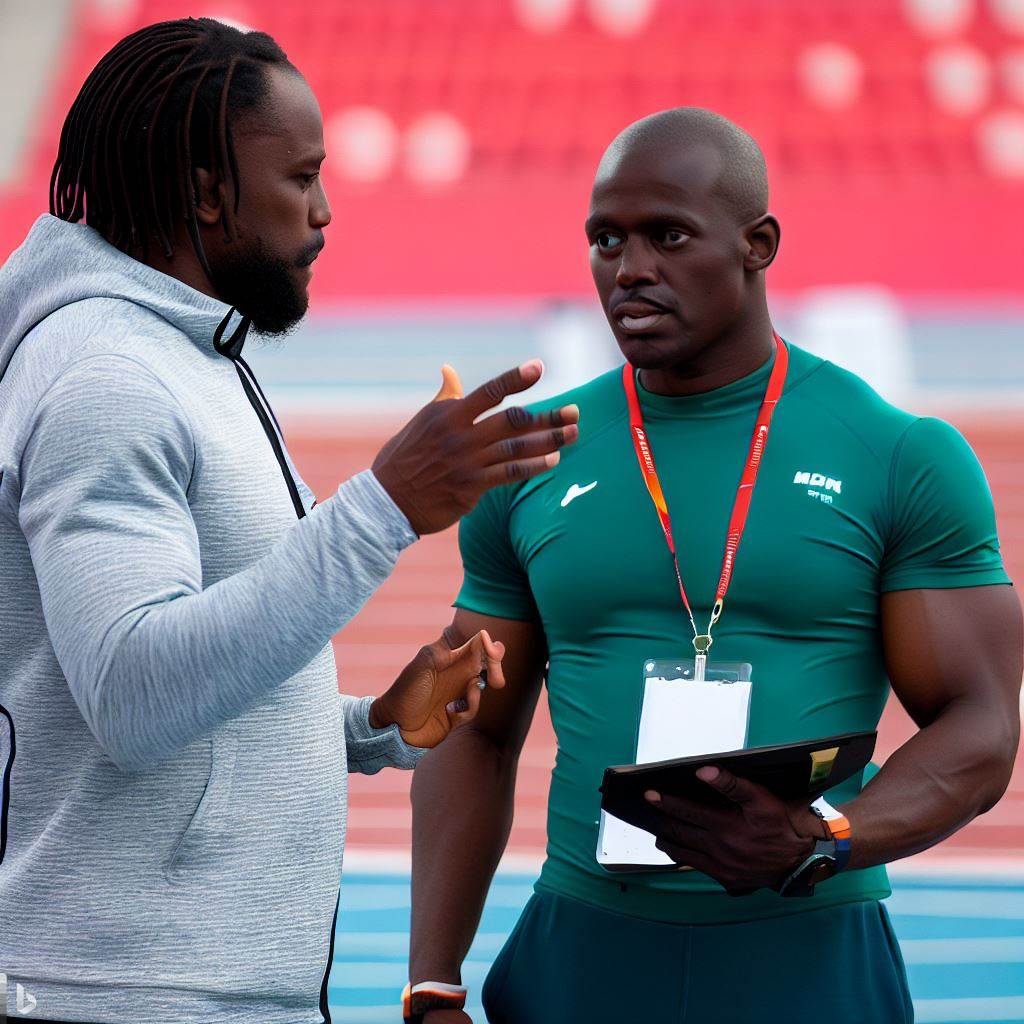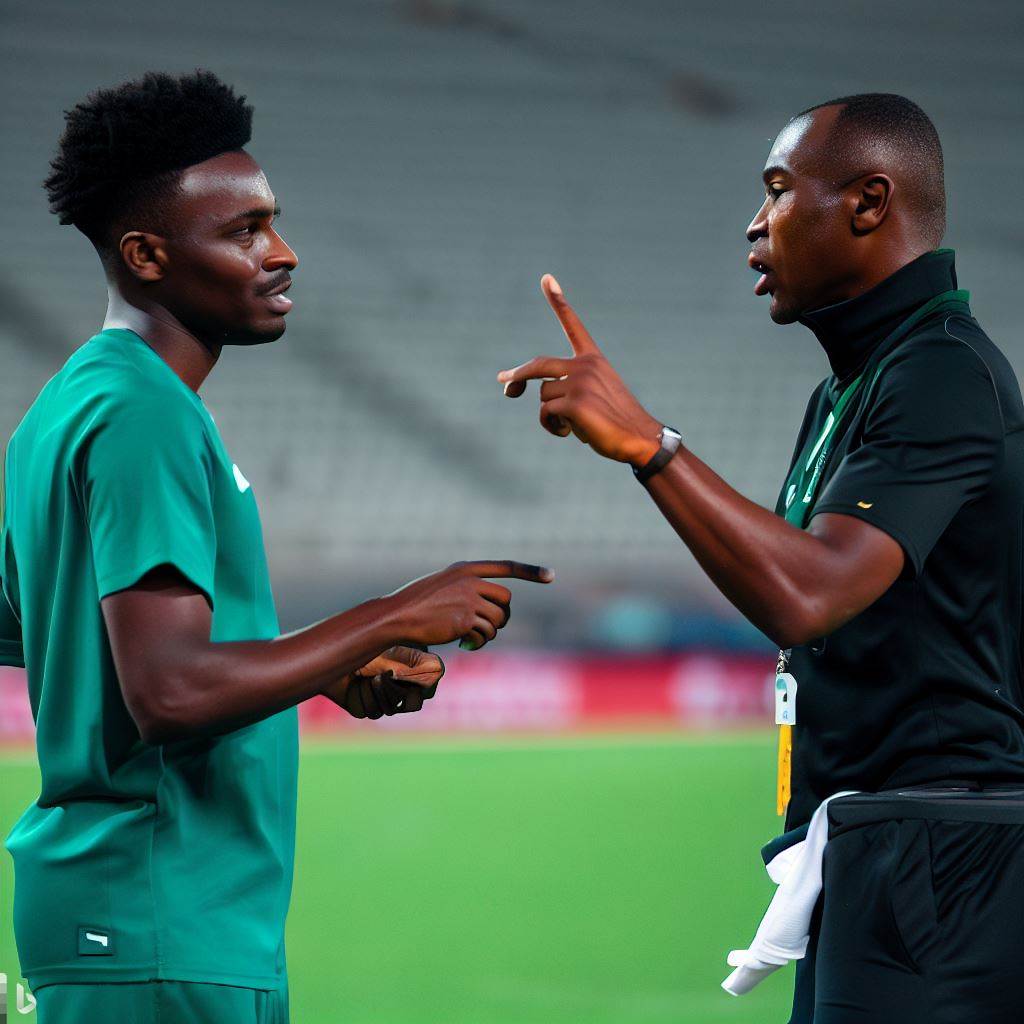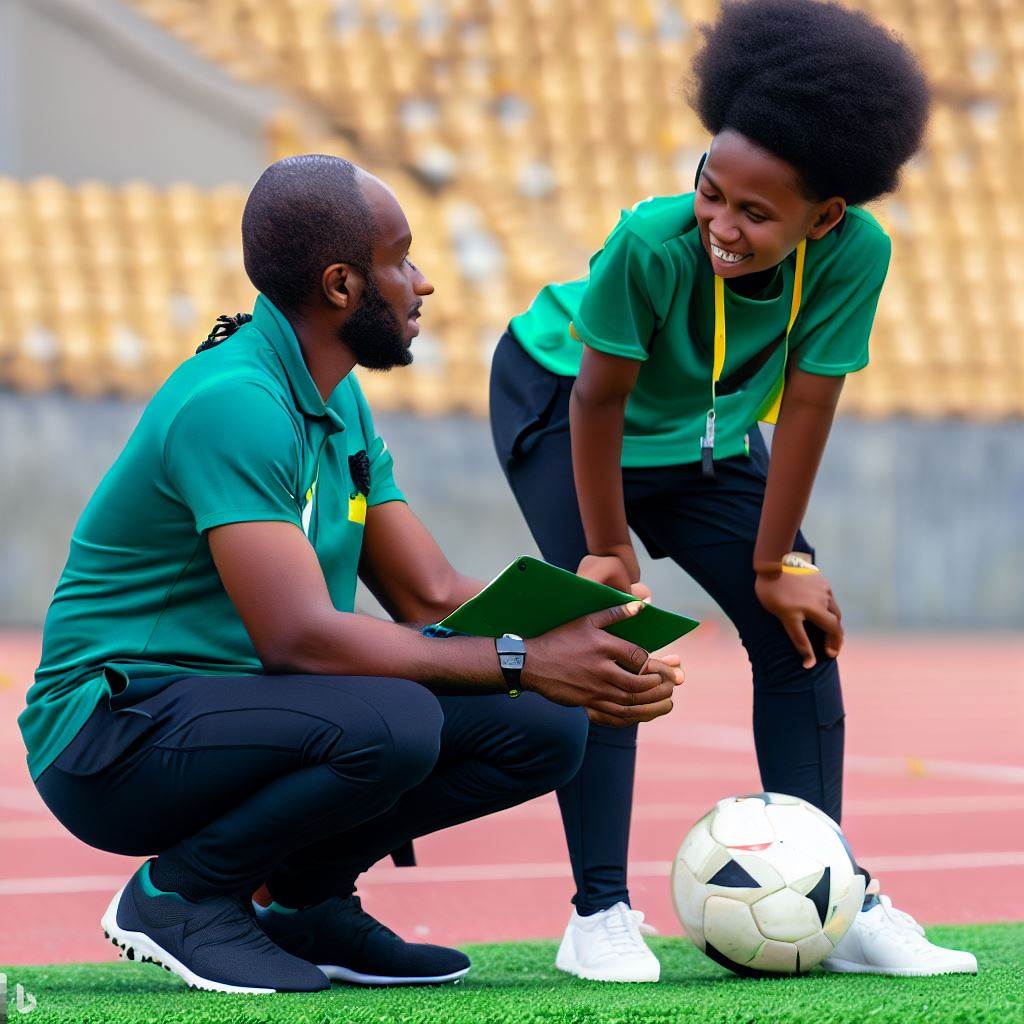Introduction
Being an assistant athletic trainer is a challenging yet rewarding role, especially in Nigeria. Dive into the bustling world of sports and healthcare as we unveil the dynamic life of an assistant athletic trainer in Nigeria.
Here, we will explore the life of an assistant athletic trainer in Nigeria, the specific location for this blog post.
- An assistant athletic trainer in Nigeria is a dedicated healthcare professional specializing in sports-related injury prevention and care.
- They work closely with athletes to optimize performance, ensure safety, and provide rehabilitation when injuries occur.
- These trainers are essential for the well-being of Nigerian athletes, spanning various sports disciplines.
A Day in the Life in Nigeria
- A typical day for a Nigerian assistant athletic trainer begins early, often before athletes’ training sessions.
- They assess and prepare equipment, treatment rooms, and facilities.
- During training, trainers are vigilant, monitoring athletes for signs of fatigue, injury, or discomfort.
- Post-training, they provide immediate care, addressing injuries, sprains, or strains.
- Rehabilitation sessions follow, where trainers work closely with injured athletes on recovery exercises.
- Administrative tasks, like maintaining records and communicating with coaches, round out their day.
- Being on-call is common, as athletes may need assistance during competitions or late-night recovery sessions.
- The day ends with reviewing treatment plans and preparing for the next day’s challenges.
In Nigeria, assistant athletic trainers are the unsung heroes behind athletes’ success and well-being, ensuring they perform at their best while staying safe and healthy.
Overview of the Assistant Athletic Trainer’s Role
An assistant athletic trainer plays a crucial role in ensuring the well-being and optimal performance of athletes.
They work closely with the head athletic trainer and other healthcare professionals to provide comprehensive care to athletes.
Here are some of the duties and responsibilities of an assistant athletic trainer:
- Evaluating and assessing injuries: Assistant athletic trainers are responsible for evaluating and assessing injuries sustained by athletes during training or competitions.
- Developing treatment plans: They collaborate with the head athletic trainer to develop and implement individualized treatment plans for injured athletes.
- Providing first aid: Assistant athletic trainers are trained to provide immediate first aid to athletes in case of injuries such as sprains, strains, cuts, or bruises.
- Administering rehabilitation programs: They assist in designing and implementing rehabilitation programs for athletes recovering from injuries to ensure a safe and effective return to play.
- Monitoring progress and making adjustments: Assistant athletic trainers closely monitor athletes’ rehabilitation progress and make necessary adjustments to treatment plans as needed.
- Preventing injuries: They educate athletes on injury prevention techniques, including proper conditioning, warm-up exercises, and safe training practices.
- Providing on-field support: Assistant athletic trainers are present during practices and games to provide immediate medical attention to athletes if an injury occurs.
- Collaborating with healthcare professionals: They work collaboratively with physicians, physical therapists, and other healthcare professionals to ensure comprehensive care for athletes.
The role of an athletic trainer is vital in promoting the health and well-being of athletes.
Here are the reasons why they are essential:
- Injury prevention: Athletic trainers play a crucial role in implementing injury prevention programs, which help reduce the risk of injuries among athletes.
- Rapid and appropriate injury management: They are trained to assess and manage injuries promptly, ensuring athletes receive the best possible care immediately.
- Rehabilitation and performance enhancement: Athletic trainers aid in the rehabilitation process, helping athletes recover from injuries and improve their performance levels.
- Long-term health and wellness: By promoting proper conditioning, nutrition, and injury prevention techniques, athletic trainers contribute to the long-term health and overall wellness of athletes.
- Psychological support: They provide emotional support to athletes during the recovery process, helping them cope with the physical and emotional challenges associated with injuries.
- Educating athletes: Athletic trainers educate athletes about the importance of maintaining good physical health, injury prevention strategies, and proper post-injury care.
- Emergency response: In case of emergencies or life-threatening situations, athletic trainers are equipped with the necessary skills to provide immediate medical assistance.
In essence, assistant athletic trainers play a crucial role in the overall health and well-being of athletes.
Through their various duties and responsibilities, they contribute to injury prevention, rapid injury management, rehabilitation, and overall performance enhancement for athletes.
Read: Breaking Down Nigeria’s Athletics Training Systems
Background Information on Nigeria’s Sports Culture
When it comes to sports, Nigeria is a country that takes great pride in its athletic achievements.
Sports play a significant role in Nigerian society, bringing people together and uniting the nation.
Significance of Sports in Nigerian Society
- Sports serve as a source of national identity, fostering a sense of patriotism among Nigerians.
- Football, commonly known as soccer, is the most popular sport in Nigeria and has a massive following.
- Sports provide a platform for social and economic empowerment, especially for young Nigerians.
- They offer opportunities for talent development and serve as a means of social integration.
- Sports have become a source of inspiration and hope for many Nigerians, promoting unity and togetherness.
Popular Sports and the Prevalence of Athletics in Nigeria
Athletics is deeply ingrained in Nigeria’s sports culture and has produced some of the country’s greatest sporting heroes.
Track and field events have gained significant popularity due to the success and dominance of Nigerian athletes.
The following are some popular sports in Nigeria:
- Football: As previously mentioned, football is undisputedly the most popular sport in Nigeria.
- Basketball: Nigeria has seen a surge in basketball’s popularity, with the national team making waves on the international stage.
- Athletics: Track and field events such as sprinting, long distance running, and jumping have a rich history in Nigeria.
- Boxing: Nigerian boxers have achieved success in both amateur and professional boxing, representing the country globally.
- Wrestling: Traditional wrestling, known as “Dambe,” holds cultural significance and showcases Nigeria’s rich heritage.
- Tennis: Nigeria has produced talented tennis players, contributing to the growth of the sport in the country.
Nigeria’s commitment to athletics is evident in its notable achievements on the international stage.
Nigerian athletes have won numerous medals in global competitions like the Olympics and the Commonwealth Games, elevating the country’s reputation in the sporting world.
In general, sports hold immense significance in Nigeria’s society, uniting the nation and serving as a source of inspiration.
With football as the most popular sport and the prevalence of athletics, Nigerian sports culture continues to flourish, nurturing talent and promoting social integration.
Read: Nigeria’s Athletics Professions: Potential and Pitfalls

A Typical Day in the Life of an Assistant Athletic Trainer in Nigeria
- Wake-up and morning routine: Time, preparations, and self-care. As an assistant athletic trainer in Nigeria, my day begins with an early wake-up call to ensure I have enough time for my morning routine and preparations. I start by freshening up, having a healthy breakfast, and getting ready for the day ahead. Self-care is crucial to ensure I am physically and mentally prepared for the demands of my job.
- Travel to the training venue: Means of transportation and commutes. Once I am ready, I make my way to the training venue. In Nigeria, the means of transportation can vary, but I usually rely on public transportation or carpooling with fellow trainers. The commute can sometimes be challenging due to traffic, but I find ways to make the most of the time, such as listening to podcasts or catching up on sports news.
- Pre-training/pre-game preparations: Setting up equipment, organizing medical supplies
- Upon arriving at the training venue: I start my pre-training/pre-game preparations. This involves setting up the equipment needed for the day’s activities, such as athletic tape, ice packs, and medical kits. I ensure that everything is organized and readily accessible, allowing for quick response during emergencies.
- Interactions with athletes: Building relationships, providing support, and answering questions. One of the most important aspects of my job is building relationships with the athletes. I strive to create a supportive and trusting environment where they feel comfortable seeking assistance. I am always there to answer any questions they may have and provide emotional support when needed.
- Injury prevention and assessment: Conducting medical evaluations, implementing preventive measures. As an assistant athletic trainer, I play a crucial role in injury prevention. I conduct regular medical evaluations to identify any potential risks or underlying conditions. Based on the assessments, I then implement preventive measures, such as recommending specific exercises or providing guidance on proper techniques to reduce the chances of injuries.
- During training/pre-game: Assisting athletes during warm-ups, monitoring their physical conditionDuring training or pre-game warm-ups, I am actively involved in assisting the athletes. I provide guidance on stretching exercises, help them with their warm-up routines, and ensure they are performing activities safely. Throughout the session, I closely monitor their physical condition, making note of any signs of fatigue or discomfort.
- Post-training/post-game: Providing recovery and rehabilitation guidance, attending to any medical incidents. After the training or game has ended, my role transitions to recovery and rehabilitation. I provide guidance on post-workout stretching and cooling down techniques to minimize muscle soreness and promote faster recovery. Additionally, I am always prepared to attend to any immediate medical incidents or injuries that may occur during this time.
Overall, being an assistant athletic trainer in Nigeria is a demanding yet rewarding job.
It involves careful preparation, effective communication with athletes, and an unwavering commitment to their well-being.
Each day brings new challenges, but the opportunity to make a positive impact on the athletes’ lives makes it all worthwhile.
Read: A Close Look at the Nigerian Professional Sports Infrastructure
Challenges and Rewards of Being an Assistant Athletic Trainer in Nigeria
Potential Difficulties Faced
- Limited resources make it challenging to provide top-notch care for athletes.
- Inadequate facilities hinder the effectiveness of training and treatment sessions.
- Access to specialized equipment and technology is often limited or non-existent.
- Lack of funding and financial support restricts the development of athletic training programs.
- Limited medical personnel and specialists make it difficult to seek expert advice when needed.
- Language barriers may arise when communicating with athletes who speak different languages.
Satisfaction and Fulfillment Derived from Playing a Vital Role in Athletes’ Lives
- Witnessing athletes overcome challenges and achieve their performance goals is highly rewarding.
- Playing a vital role in the rehabilitation process and seeing injured athletes return to the field is fulfilling.
- Building strong relationships with athletes and being part of their support system brings immense satisfaction.
- The opportunity to contribute to the development of sports in Nigeria is gratifying.
- Being able to positively impact athletes’ overall well-being and health is incredibly fulfilling.
- Continuous learning and growth in the field of athletic training provide a sense of accomplishment.
In Nigeria, being an assistant athletic trainer comes with its fair share of difficulties and challenges.
Limited resources and inadequate facilities make it a constant struggle to provide the best possible care for athletes.
Without access to specialized equipment and technology, the effectiveness of training and treatment sessions is compromised.
Furthermore, the lack of funding and financial support restricts the development of athletic training programs, hindering the ability to provide comprehensive services.
One of the major hurdles faced by assistant athletic trainers in Nigeria is the limited availability of medical personnel and specialists.
The shortage of experts in the field makes it challenging to seek professional advice and guidance when needed.
Additionally, the language barrier can pose communication challenges when working with athletes who speak different languages.
Despite these difficulties, the role of an assistant athletic trainer in Nigeria offers immense satisfaction and fulfillment.
Witnessing athletes overcome challenges and achieve their performance goals is highly rewarding.
Being a part of the rehabilitation process and seeing injured athletes recover and return to the field brings a deep sense of fulfillment.
Building strong relationships with athletes and being a part of their support system is another rewarding aspect of the job.
The trust and bond that develop between trainers and athletes are invaluable.
Additionally, being able to contribute to the overall development of sports in Nigeria is gratifying.
Assistant athletic trainers play a vital role in nurturing talent and promoting sports participation in the country.
One of the most fulfilling aspects of being an assistant athletic trainer is the ability to positively impact athletes’ overall well-being and health.
By providing thorough care and guidance, trainers can help athletes maintain their physical and mental well-being, ensuring their long-term success.
Moreover, the field of athletic training offers continuous learning and growth opportunities.
Keeping up with the latest research, techniques, and best practices is essential for delivering the highest level of care.
This constant pursuit of knowledge and improvement provides a sense of accomplishment and personal growth for assistant athletic trainers in Nigeria.
While facing challenges such as limited resources, inadequate facilities, and a lack of funding, the rewards and satisfaction derived from being an assistant athletic trainer far outweigh the difficulties.
The opportunity to work closely with athletes, witness their progress, and contribute to their well-being and success make this profession in Nigeria truly fulfilling and meaningful.
Read: Steps to Building a Career in Nigeria’s Sports Field
Conclusion
Being an assistant athletic trainer in Nigeria is a demanding but rewarding role. Each day is filled with a variety of responsibilities, from assessing injuries to designing exercise programs.
The goal is always to ensure the physical well-being of athletes.
Athletic trainers play a crucial role in supporting athletes’ physical health and helping them reach their full potential.
They provide immediate care for injuries, which is essential in preventing further damage and improving recovery time.
By incorporating preventative measures, such as education on proper nutrition and mechanics, they contribute to long-term athlete development.
It is important to appreciate the hard work and dedication of assistant athletic trainers not only in Nigeria but also around the world.
They often work long hours and face challenging situations, but their passion for helping athletes shines through.
Their expertise and commitment contribute significantly to the success of athletes and sports teams.
So, let us acknowledge the vital role assistant athletic trainers play in ensuring the physical well-being of athletes.
Their efforts behind the scenes are essential to the overall success and performance of athletes.
Whether in Nigeria or elsewhere, we owe them our gratitude and respect for their unwavering dedication.




